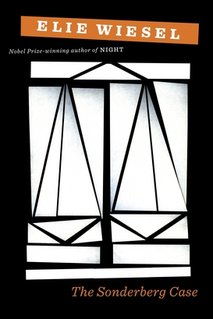
24 Aug 2010 11:06:18
In all bookshops we can see new novel from Elie Wiesel, which was translated by Catherine Temerson, its name "The Sonderberg Case," Yedidyah is the child of survivors. From the actor he turned to the theater critic, assigned by his New York newspaper editors to help cover the murder trial of a young German accused of killing his uncle. On the first day of the trial, Yedidyah hears Werner Sonderberg declare himself both guilty and innocent.
This perplexing statement eats at Yedidyah throughout the trial — and long after Sonderberg is acquitted. Many years later, Sonderberg requests a meeting with the writer. Yedidyah agrees, too curious to ignore the request.
Like his previous novels, Wiesel's "The Sonderberg Case" seems to draw heavily from the author's own struggles.
When the trial is over, Yedidyah decides to accept an assignment in Jerusalem for the newspaper. He meets a woman who is in mourning for her son. When he asks if she thinks she will ever find happiness again, she looks at him "as though she had understood not the meaning of my question, but the very nature of my Jewishness."
"The Sonderberg Case" isn't linear. The story revolves around Yedidyah's connection with his family history, especially the men. Everyone in his family believes that his grandfather is crazy, but Yedidyah understands his wisdom. His grandfather tells him: "Beware — one day, you, too, might be called a lunatic."
Written in Wiesel's signature musical style, the characters become striking and complex, each with his or her own story within a story. Wiesel has always commanded attention on the page, and "The Sonderberg Case" is no different.
Wiesel writes as though he's one of the last of an angry and still grieving generation with something to say. His memoir, "Night," was based on his own Holocaust survival story.
The story line of "Sonderberg" jumps around so much it can be difficult to follow. But in the end, Wiesel's writing makes up for it. This is a book you will read aloud to your grandchildren
This perplexing statement eats at Yedidyah throughout the trial — and long after Sonderberg is acquitted. Many years later, Sonderberg requests a meeting with the writer. Yedidyah agrees, too curious to ignore the request.
Like his previous novels, Wiesel's "The Sonderberg Case" seems to draw heavily from the author's own struggles.
When the trial is over, Yedidyah decides to accept an assignment in Jerusalem for the newspaper. He meets a woman who is in mourning for her son. When he asks if she thinks she will ever find happiness again, she looks at him "as though she had understood not the meaning of my question, but the very nature of my Jewishness."
"The Sonderberg Case" isn't linear. The story revolves around Yedidyah's connection with his family history, especially the men. Everyone in his family believes that his grandfather is crazy, but Yedidyah understands his wisdom. His grandfather tells him: "Beware — one day, you, too, might be called a lunatic."
Written in Wiesel's signature musical style, the characters become striking and complex, each with his or her own story within a story. Wiesel has always commanded attention on the page, and "The Sonderberg Case" is no different.
Wiesel writes as though he's one of the last of an angry and still grieving generation with something to say. His memoir, "Night," was based on his own Holocaust survival story.
The story line of "Sonderberg" jumps around so much it can be difficult to follow. But in the end, Wiesel's writing makes up for it. This is a book you will read aloud to your grandchildren

